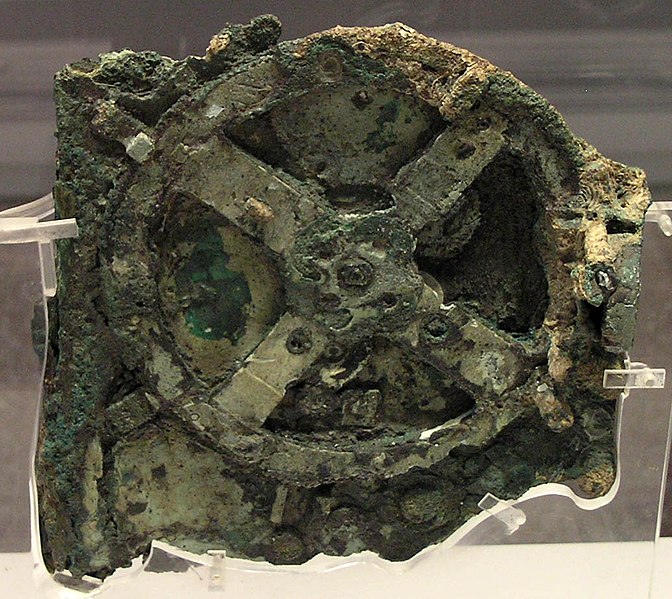I do not often write on such recent historical matters but this case is really fascinating, involving not just history and archaeology but also astronomy and sophisticated mechanics that anticipate modern computers.
Jo Marchant, Ancient astronomy: Mechanical inspiration. Nature News, 2010. Open access (article).
See also: GrrlScientist's article at Punctuated Equilibrium blog at The Guardian: The Antikythera Mechanism. This is what I want for Christmas!
This last article (found via Archaeology in Europe), features a fancy video of a Lego reconstruction of the mechanism (which is pretty curious indeed) but more interesting are maybe the following two videos from Nature YouTube channel:
It is lovely, I understand, to see how these ancient peoples had such a complex understanding of Astronomy, being able to predict eclipses with high detail. But maybe even more fascinating is that they were already building elaborate clock mechanisms for that purpose, devices not known to have existed otherwise until the eve of Modern Age.
In the last video it is suggested that the astro-clock could have been invented by Archimedes of Syracuse, whom we know was the most celebrated scientific genius of Antiquity. The geography suggested by the mechanism is one of the Ionian Sea, not the Aegean or the East Mediterranean, however the date is from a century after Archimedes died. Yet they ponder if there could have been an Archimedean school in Syracuse for some time, which was in fact producing these technological marvels, whose knowledge was later lost.
It is also impressive to realize how technology may be lost, maybe because of lack of demand or socio-cultural drive. Ancient Greeks also knew of other marvels such as rudimentary steam engines, which never had much of an impact in that society overall - yet they would change everything two millennia later.

It has been hypothesized that while the scientific knowledge to make these devices was present then, that it stalled without a large manufacturing base to support it, in the same way that early moveable type efforts stalled for lack of the infrastructure to produce them in volume.
ReplyDeleteYes, I've read that too. However I had a very good history teacher in 9th or 10th grade who understood that all processes or socio-cultural dimensions are interrelated, not just economy and science but also art, culture, social structures, etc.
ReplyDeleteIn this sense, Rome had some important manufacturing industries, specially for the Army and gatherer a large free trade zone under a single government. But on the other hand it was a slaver society and nobody competed with it in the economic aspect (unlike what happened in Europe during the late Middle and Modern ages, when countries were all trying to get even the slightest advantage over their neighbors).
In this sense, mutatis mutandi, a comparison with China can be drawn: there was no socio-cultural nor political interest to better, to gain an edge from such technologies, except what could be directly used for war (Greek fire and such). Conservative ideologies like Plato's or Paul's became eventually dominant: the empire was too rigid to innovate in any direction that was not greater accumulation of power in the oligarchy (eventually leading to feudalism).
When, in the Reinassance, all this stuff was rediscovered, it caused great changes because states were pitted against each other and hence many relied largely in technology ("arts" in the widest sense) to gain an edge, either in trade, military or prestige.